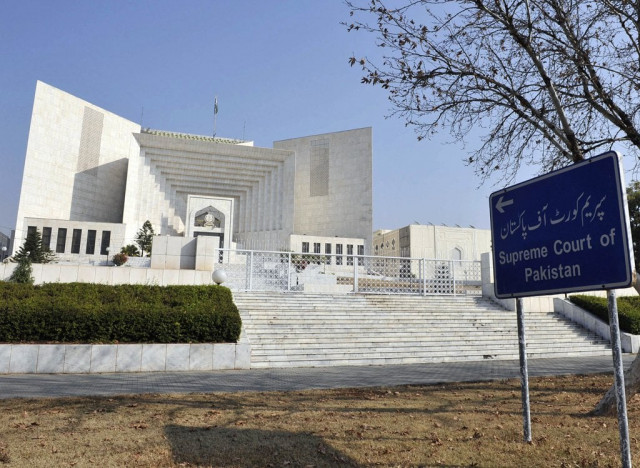CJP shares with judges’ draft for amending SC rules
Draft recommends that top judge take sou motu notice in consultation with two senior judges

The Supreme Court of Pakistan. PHOTO: AFP
The draft was shared at December 12 full-court meeting of the Supreme Court.
According to the draft, the CJP will take suo motu notice on any matter after consulting with two senior most judges. Later the matter will be referred to a bench that will examine the matter on judicial side.
The bench's decision could be challenged through an Intra Court Appeal (ICA), which will be heard by a larger bench. Top court judges have been deliberating over regulating suo motu powers but there is little chance that they could reach a consensus before CJP Khosa retires on December 20 (tomorrow).
CJP Khosa in his first speech on January 17 said an effort shall be made – either through a full-court meeting or through a judicial exercise – to determine and lay down the scope and parameters of exercise of the original jurisdiction of this court under Article 184(3) of the Constitution.
“And, if deemed appropriate, to carve out the scope of an Intra-Court Appeal in such matters through an appropriate amendment of the Supreme Court Rules or to suitably amend the provisions relating to review jurisdiction so as to enlarge its scope in such cases,” he said.
The first full-court meeting was held on February 6 to deliberate this issue. No SC official was present during the two-hour full-court meeting.
According to the minute of that meeting, it was resolved that “the issue of exercise of jurisdiction under Article 184 (3) of the Constitution was discussed threadbare from all possible angles and it was affirmed that such jurisdiction will be exercised in accordance with the Constitution.”
Senior lawyers believe that there was no consensus among the SC judges to regulate the public interest jurisdiction and giving right of appeal in suo motu cases through amending the SC rules.
CJP Khosa in his speech on the eve of new judicial year on September 11 noted that the scope of this court’s jurisdiction under the said article of the Constitution is a matter of judicial interpretation and a plethora of case-laws already exists on the subject but suo motu initiation of proceedings under that Article is a matter of procedure and the same is yet to be conclusively determined.
He said in one of the full-court meetings held in the last judicial year, the judges had discussed different aspects of this issue in some depth and in the next full-court meeting a draft was likely to be presented and discussed proposing a suitable amendment of the relevant part of the Supreme Court Rules, 1980 and determining how a suo motu notice may be taken of a matter by the Court.
“I am confident that the said issue shall be settled soon bringing consistency of practice and eliminating arbitrariness and whimsicality in the matter,” he had said.
The big challenge, however, is to evolve consensus among the Supreme Court judges, who have had a different approach in exercising public interest jurisdiction in the past.
It is debatable whether all judges will be unanimous in structuring the chief justice’s discretionary powers in initiating public interest litigation.
Since taking oath as the CJP, Justice Khosa has not taken any suo motu notice.
The country is still struggling due to the judicial interference by his predecessors in commercial deals.The outgoing CJP also formed benches comprising senior most judges to hear public interest cases for ensuring transparency.
Since the Lawyers’ Movement of 2007, different CJP’s have shown different approaches to judicial activism. In 2009, the superior judiciary led by former CJP Iftikhar Chaudhry initiated public interest litigation for enforcement of fundamental rights.
Later, CJP Saqib Nisar further reinforced the approach of judicial activism. However, former chief justices – Tassaduq Hussain Jillani, Nasirul Mulk, and Anwar Zaheer Jamali –used suo motu power sparingly.


1724319076-0/Untitled-design-(5)1724319076-0-208x130.webp)
















COMMENTS
Comments are moderated and generally will be posted if they are on-topic and not abusive.
For more information, please see our Comments FAQ